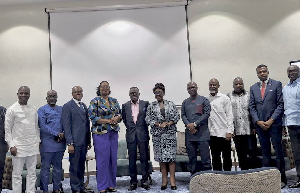Minister of Tourism, Culture and Creative Art, Abla Dzifa Gomashie, has commended Eagles Hospitality Group for taking a “bold and visionary” step in launching a dedicated hospitality training school, a move she says will significantly strengthen the country’s tourism and service ecosystem.
Speaking at the official launch of the Eagles Hospitality School, the Minister expressed excitement that a long-held dream of seeing specialized industry-driven training has been realized—not through government, but by the private sector.
“I mentioned at the launch of Kempinski’s 10th anniversary that I had challenged them to set up a hospitality school, because what we currently have under the ministry does not meet the standard or numbers needed to properly educate personnel in the tourism, culture, and creative arts ecosystem,” she said.
“So for the private sector to now take charge is really exciting. I charged Kempinski to do it, and before they could, Christian Asante has done it. It means there’s room for more,” she added.
She further encouraged other private stakeholders to invest in similar initiatives across Ghana’s 16 regions, whether as satellite campuses or partnerships with existing institutions.
“This industry is truly driven by the private sector. The example has been set, and I hope many others who have the resources but don’t know where to invest will see this as a model and replicate it.”
The Eagles Hospitality School, spearheaded by Eagles Hospitality Group in partnership with Nova Business School Africa, aims to provide practical, hands-on training for students entering Ghana’s hospitality workforce.
Christian Asante, president of Eagles Hospitality Group, outlined the school’s vision, emphasising a training-first model designed to prepare students for real-world industry demands.
“It’s not going to be a typical academic institution. This is practical immersion. You come in, and you come out a hospitality professional,” he explained.
Asante revealed that hotel meeting rooms in Accra and Takoradi will be converted into training classrooms capable of hosting up to 100 students per session, with up to seven such rooms available.
“Part of the training will be free, especially for students from underprivileged backgrounds. We’ll train them, offer internships where they’ll be paid, and by the time they leave, they’ll be employable, even if not in five-star hotels, then in one- or two-star establishments,” he added.
He also touched on the school’s alignment with Ghana’s 24-hour economy vision, suggesting that hospitality training could run around the clock.
“Hotels run 24/7. If the 24-hour economy policy works well, we can make our classrooms productive 24 hours a day. All we need are trainers on rotation.”
The initiative has been widely welcomed by stakeholders and is expected to address a long-standing skills gap in the tourism and hospitality sector, boosting service quality and job readiness as Ghana seeks to position itself as a premier destination for global travellers.



